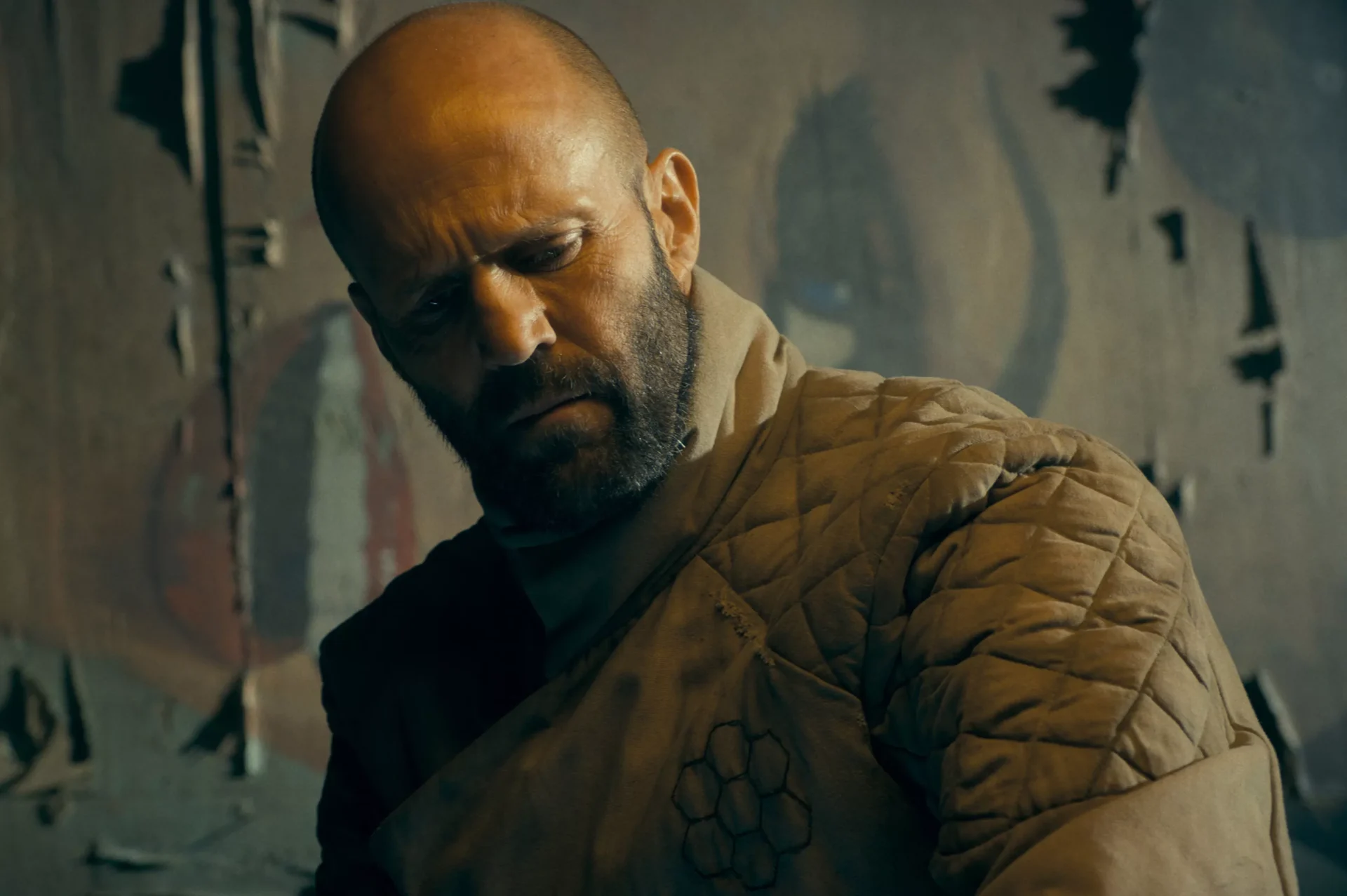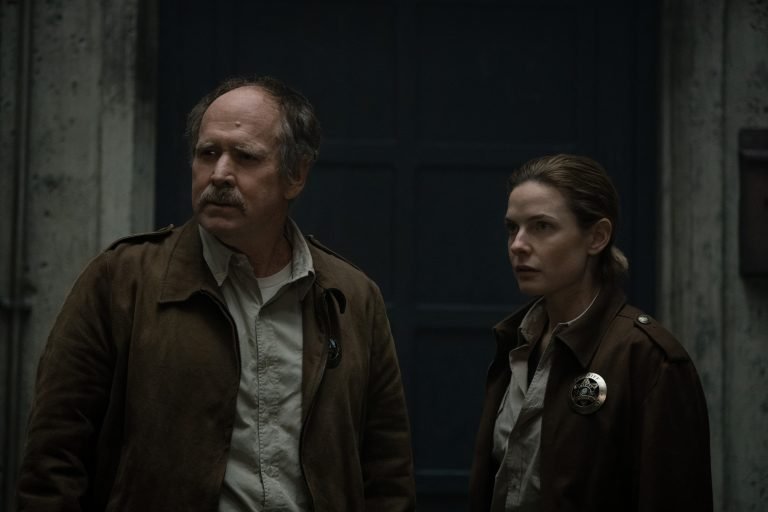It was only a couple of months ago that I completed “The Equalizer” series and despite all my criticism in terms of the performative goodness of these protagonists, I had enjoyed my engagement with those films. After all, they make you feel angry through several obnoxious characters, let the anger accrue, and then provide you catharsis when these characters meet retribution at the hands of the protagonist. You can have disagreements/reservations, but these films are mostly a culmination of moments; hence, moments are rewarding. “The Beekeeper,” like “The Equalizer,” has a screenplay committed to stylish violence but also, unlike it to a degree, is self-reflexive.
Jason Statham is limited in his acting abilities and doesn’t have the charm of Denzel either, but he is seasoned in his punches, having done mostly this type of cinema. Nevertheless, this type of cinema has exhausted its foundational mythology. The myth of a ghost with a violent past who shouldn’t be awakened lest you experience his wrath upon you. The challenge doesn’t lie with a story repeating itself. The challenge lies in the method of storytelling and, most importantly, the set pieces. These are the avenues in which the genre is being stretched to its creative optimum. Allow me to explore where “The Beekeeper” sweetens and where it stings.
Adam Clay (Jason Statham) spends a quiet life as a beekeeper and as a tenant to Eloise Parker (played by Phylicia Rashad), a retired schoolteacher. He helps her in odd jobs, and she takes care of him like a doting guardian. Clay feels at home. One day Eloise gets robbed of all her savings and a charity fund she was a signatory to in a phishing scam. Having lost over $2 million of money that people trusted her with, she kills herself. Clay takes this personally and begins to hunt those engaged in phishing that abated Eloise’s suicide. Meanwhile, Eloise’s daughter, Verona (an FBI agent played by Emmy Raver-Lampman), informs that the FBI has been searching for the group of scammers for quite a while.
Clay is revealed to be a former operative of a secret organization called The Beekeepers, which had been purposefully kept outside the law so as to protect the “hive” or, in other words, the status quo. When things within the system go beyond the corrective faculties of the law, the beekeepers step in and eliminate the problem, an extra-judicial organization, the existence of which is only mythical. The phishing operations are run by Derek Danforth (played by Josh Hutcherson), son of the incumbent president of the United States. Given the characters’ identities, Adam Clay starts mimicking the role of a soldier bee that kills the queen when the queen produces a faulty offspring.

The behavior of the bees in a colony is motivated by the cause of survival for the entire species. The bees will kill the monarch when the system destabilizes or malfunctions. Similarly, the existence of Derek Danforth is symptomatic of a system malfunction that needs to be corrected by forces outside of the law that define its routine functioning. The plot has enough substance to be used as fodder for action. Kurt Wimmer has written a story that incorporates the most fundamental trope of the genre, that of a savior with an anti-system goal. But the scope of this anti-system element is too narrow.
It all boils down to one person, and his elimination is supposed to restore the system. This choice is completely coherent within this universe and also quite apt for entertainment, even though its political messaging is limited. There is no metaphor or a deeper truth waiting to be revealed. The stakes aren’t high for the system but only for the people involved. But like the Equalizer Robert McCall, Adam Clay is so smooth in his confrontations that no enemy appears formidable. There are attempts to create substantial challenges for the protagonist, but none emerge as a real threat. He cakewalks his way into the President’s mansion and completes his self-appointed mission. But prior to that, he is challenged in a duel by Lazarus (played by Taylor James), which happens to be the action highlight of the film.
The knife fight in the sequence is smart and gripping. David Ayer makes one of his intelligent choices in the sequence by establishing that Adam Clay is only a man, and the affirmation has a comic appeal to it. What appears to be a battle of equals only stops being so because Clay uses his opponent’s disability to his advantage. But this small sequence merits Lazarus’ claim that he had once killed a beekeeper but only due to sheer luck and at the cost of one leg. The exposition deserves its spinoff. At the same time, the mythology of the beekeepers can also be exploited across industries for their spinoffs. Would I not love the Indian beekeeper fighting against the power elite because the system has malfunctioned (and by malfunction, I do not mean economic corruption but communalism and institutionalization of hatred)?
While my democratic senses do not sit comfortably with the idea of a state agent turned vigilante outside the system, in no way different from superhero mythologies, “The Beekeeper” remains enjoyable due to the simplicity of its narrative. Here’s an angry hero who lost someone, so he will kill whoever caused it, and there aren’t many external agents to influence the circumstances and/or choices. That being said, Verona sticks out like a sore thumb as a character who doesn’t contribute much apart from prettiness. Emma acts terrible enough for Jason Statham to appear as the better performer of the two, and her character seems to be written without enthusiasm. So much so that there is absolutely no effect (of grief) to be seen onscreen for a daughter who lost her mother.
I will recommend this film in theatres if the expectations are set right and if what it offers qualifies for a good time in your cinephilia.



![About Love [2019] Review: A Nuanced Exploration of Love in a Regular, Indian Family](https://79468c92.delivery.rocketcdn.me/wp-content/uploads/2021/08/About-Love-2019-MUBI-2-768x432.jpg)

![The Hound of The Baskervilles [1959] Review – The weirdest Sherlock Holmes Adaptation is also the best](https://79468c92.delivery.rocketcdn.me/wp-content/uploads/2021/05/The-Hound-of-the-Baskervilles-1959-highonfilms-2-768x443.jpg)


